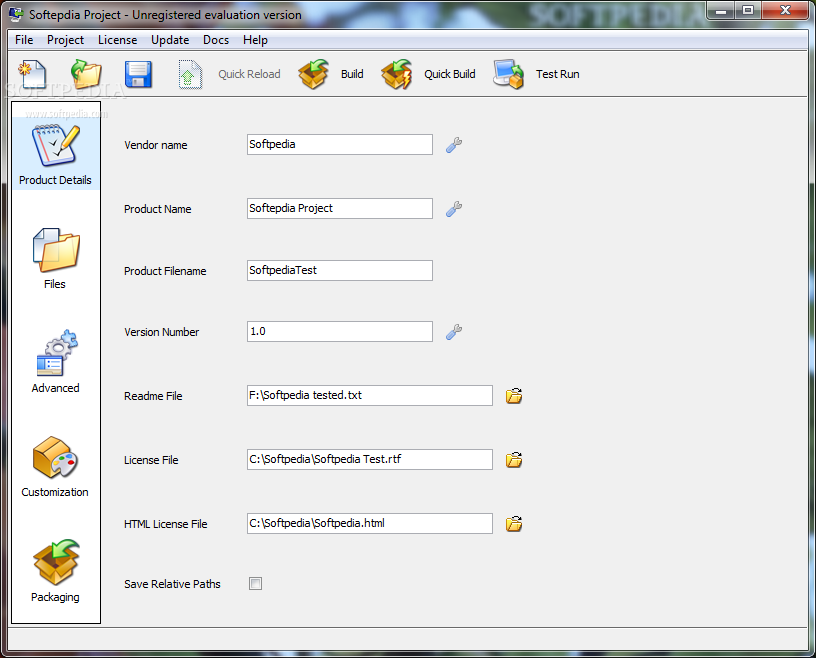BitRock InstallBuilder 7.2.5
BitRock InstallBuilder is an application which allows users to create easy-to-use installers for your software. The generated installers provide native look and feel and desktop integration for Windows, KDE, Gnome and Aqua and are optimized in size and speed, reducing download, startup and installation time.
BitRock Installers are single-file, self-contained native executables with no external dependencies and minimal overhead. All BitRock installers are truly native code, do not require bundling a Java Runtime Environment and provide an intuitive interface on all platforms, even for users without Linux experience.
BitRock InstallBuilder includes an easy to learn, easy to use GUI environment that can be run on Windows and Linux. For advanced users, a friendly XML project format supports source control integration, collaborative development and customizing projects both by hand and using external scripts.
A command line interface allows you to automate and integrate the building process. QuickBuild functionality allows you to update installers in a few seconds, without having to repack the entire application.
BitRock InstallBuilder provides convenient built-in actions for commonly required installation functionality such as changing file permissions, substituting text in file, adding environment variables, adding directories to the path, changing the Windows registry, launching external scripts and so on.
BitRock installers can be customized in a variety of ways, graphically and in functionality, and run on GUI, text and unattended modes. An uninstall program is created as part of installation. BitRock Installers are platform and programming language independent.
· Desktop Integration: BitRock installers provide native look and feel and desktop integration for Windows, KDE and Gnome.
· RPM Integration : BitRock installers can register your software with the RPM package database, combining ease of use with the powerful RPM package management system.
· RPM and DEB generation : In addition to creating native executables that can register with the RPM subsystem, BitRock InstallBuilder can generate RPM and Debian packages that can be installed using the native package management tools.
· Optimized : BitRock installers are optimized in size and speed and do not require a self-extraction step, reducing download, startup and installation time. Built-in LZMA support provides great compression ratios.
· No External Dependencies : BitRock installers are single-file, self-contained native executables with no external dependencies and minimal overhead. Unlike competing products, all BitRock installers are truly native code and do not require bundling a Java Runtime Environment.
· Ease of Use : BitRock installers provide an intuitive and easy to use interface on all platforms, even for end users without previous Linux experience.
· Ease of Development : BitRock InstallBuilder includes an easy to learn, easy to use GUI environment. Design, build and test installers with the click of a button.
· Time Saving Functionality : For advanced users, a friendly XML project format supports source control integration, collaborative development and customizing projects both by hand and using external scripts. A command line interface allows you to automate and integrate the building process. QuickBuild functionality allows you to update installers in a few seconds, without having to repack the entire application.
· Built-in actions : BitRock InstallBuilder provides convenient built-in actions for commonly required installation functionality such as autodetecting a Java(tm) Runtime, changing file permissions and ownership, substituting text in a file, adding environment variables, adding directories to the path, creating symbolic links, changing the Windows registry, launching external scripts and so on.
· Crossplatform Build Support : The installer builder tool can run on Windows, Mac OS X, Solaris, HP-UX, AIX, FreeBSD, OpenBSD, IRIX, and Linux (Intel x86/x64, Itanium, s390, PPC) and generate installers for all target platforms from a single project file. Create all your installers from a single build environment!
· Customization : BitRock installers can be customized in a variety of ways, both graphically and in functionality. It is possible to ask for multiple parameters, like username and passwords, in the same installer screen. These helps simplify the installation process for end-users.
· Multiple Installation modes : BitRock installers provide: several GUI modes with native look-and-feel, for installation in a variety of desktop environments, a text-based installation mode, for console-based and remote installations, and a silent/unattended install mode which can be used for integration in shell scripts for automated deployment.
· Support for Qt GUI Frontend : The InstallBuilder for Qt family of products provides a new GUI installation mode using the Qt crossplatform toolkit, enhancing the end-user experience
· Rollback Functionality : BitRock installers by default perform a backup of all the files overwritten during installation, so in case there is an error, the system is recovered to its previous state.
· Uninstall Functionality : An uninstall program is created as part of every installation, allowing users to easily uninstall the software. As the installer, it can be run in a variety of modes. On Windows, uninstall functionality can also be accessed from the Add/Remove Programs entry in the Control Panel.
· Startup Failure Detection : BitRock installers will automatically detect the best installation mode available. Users also have the option to manually select a mode.
· Language and Platform Independent : BitRock installers can install applications written in any language, including: Java, PHP, Perl, Python, Ruby, C/C++ and .NET/Mono.
· Multiple Language Support : BitRock installers support a variety of installation languages, including English, German, Japanese, Spanish, Italian, French, Portuguese, Traditional Chinese, Dutch, Polish, Valencian, Catalan, Estonian, Slovenian, Romanian, Hungarian, Russian and Welsh. You can specify a default language or let the user decide.
